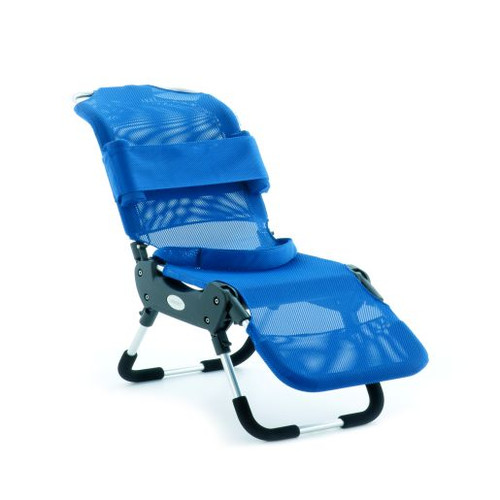Product Description
The Leckey Bath Chair complete Size 3 can rise to the height of the bath tub edge or lower to the floor of the tub — allowing the child to relax comfortably in the warm water
The height of the front and rear legs can be adjusted independently, achieving different angle positions. The unique shape of the backrest allows the child to sit comfortably and in a relaxed position during washing. While pelvic and chest straps ensure the required level of safety is met. The Bath Chair is easily converted into a Shower Chair using the one size fits all Shower Trolly, which can be folded to a compact size and stowed away conveniently. The Shower Trolley is easily manuevered in confined spaces and has lockable castors to ensure it can be positioned safely on wet, slippery surfaces.
The Leckey bathing support was developed to achieve a new degree of functionality and easy adjustability both inside and outside the bathtub. It has a whole series of support elements for positioning and offers the option of converting it into a mobile shower support.
Advance Bath Chair Specifications:
| Size | 1 | 2 | 3 | 4 |
| Age (years) | 1 – 5 | 4 – 9 | 8 – 14 | 12 – 18 |
| User Height - Min, in (mm) | 30" (750) | 37" (950) | 45" (1150) | 53" (1350) |
| User Height - Max, in (mm) | 41" (1050) | 49" (1250) | 57" (1450) | 65" (1650) |
| Head Support, in (mm) | 6" (150) | 6" (150) | 6" (150) | 6" (150) |
| Back Support, Height in (mm) | 14" (350) | 16" (400) | 18" (460) | 22" (550) |
| Seat Depth in, (mm) | 9" (225) | 11" (275) | 13" (335) | 16" (400) |
| Calf Support in, (mm) | 10" (260) | 10" (260) | 13" (340) | 13" (340) |
| Seat Height in, (cm) | 2" – 17" (5 – 43) | 2" – 17" (5 – 43) | 2" – 17" (5 – 43) | 2" – 17" (5 – 43) |
| Maximum Weight, lbs (kg) | 159 lbs (72 kg) | 159 lbs (72 kg) | 159 lbs (72 kg) | 159 lbs (72 kg) |
| Total Width, in (cm) | 17" (43) | 17" (43) | 17" (43) | 17" (43) |
OTTO BOCK History:
Otto Bock has a long history in the durable medical products market. To understand how they started, we want to give you a little history on OTTO BOCK:
- 1919 OTTO BOCK's success story started in Berlin Kreuzberg, where prosthetist Otto Bock founded his first company ‘Orthopädische Industrie GmbH’. Component fabrication developed by Otto Bock revolutionizes the industry, making it possible to supply the large numbers of disabled veterans that came back from World War I with prostheses.
- 1920 OTTO BOCK relocation to Königsee, Thueringen (former East Germany).
- 1946 Max & Maria Näder founded the ‘Northern Branch’ in Duderstadt in the South of 'Niedersachen' to secure sales and the procurement of raw materials in West Germany after World War II.
- 1947 Max Näder becomes manager of the newly founded ‘Orthopädische Industrie KG’.
- 1948 The company assets and private property of the family in Königsee are expropriated without compensation.
- 1953 The Companies founder - Otto Bock died at the age of 64. To replace poplar wood, which has become a scarce commodity, synthetic materials are used in lower limb prosthetics. Otto Bock - Kunststoff is founded in 1953 and becomes a leading supplier of foams and foam systems for the flourishing automotive and other industries.
- 1958 OTTO BOCK spreads their wings and opens their first foreign branch in Minneapolis, Minnesota, USA
- 1960-1970 Two groundbreaking developments take the quality of prosthetic fittings to a new level—myoelectric upper limb prostheses and the modular system for lower limb prostheses.
- 1987 Max Näder founds the independent Otto Bock Foundation. First service deployment at the Paralympics in Seoul
- 1988 Since the Summer Games in Seoul, Ottobock has been supporting Paralympic sports and providing technical service for the athletes during the games.
- 1990 Professor Hans Georg Näder, son of MaxNäder becomes head of the family company at age 28. OTTO BOCK is still owner-managed in its third generation and develops into a strong brand. OTTO BOCK now has locations in more than 40 countries worldwide.
- 1992 After Germany reunified, OTTO BOCK buys back its former headquarters in Königsee, Thueringen and builds it into a production facility for wheelchairs.
- 1997 The C-Leg, the world’s first fully microprocessor-controlled leg prosthesis system, opens up a completely new dimension of walking, with unrivalled safety and dynamic response.
- 2006 The newly ActiGait neuroimplant, an Innovative therapy option for stroke patients suffering from dorsal flexor weakness, significantly improves gait pattern in individuals. OTTO BOCK goes under the skin for the first time!
- 2007 The prototype of the first "thought"-controlled arm prosthesis in the world is presented to the public in Vienna. lt leads us to the future where remaining nerves will be used to control arm prostheses directly.
- 2009 OTTO BOCK opens the Science-Center in Berlin. This innovative Center is dedicated to mobility and interactively exhibits a fascinating experience for all people. In the same year of the company’s 90-year anniversary, Max Näder dies at the age of 94.
- 2010 OTTO BOCK presents two more innovative products in prosthetics with the Genium leg prosthesis system and the Michelangelo Hand at the Orthopädie + Reha-Technik trade fair in Leipzig,
- 2012 Professor Hans Georg Näder opens OTTO BOCK's new wheelchair manufacturing plantat the former Bötzow brewery: A site, with over 23,000 sq ft. It will include a creative mix of residential, commercial and cultural space.
That is why we like OTTO BOCK! Wouldn't you?








